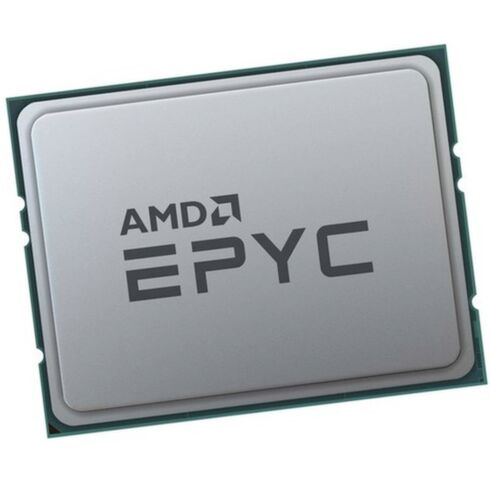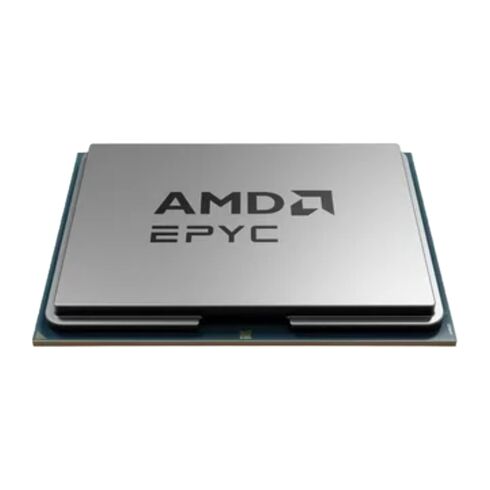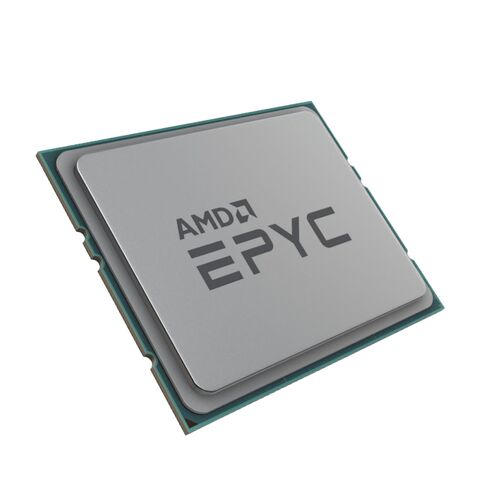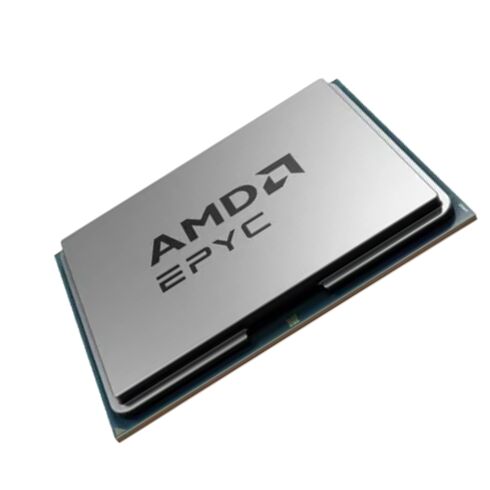100-000000078 AMD EPYC 7282 16-Core 2.8GHz 64MB L3 SP3 7NM 120W Processor
- — Free Ground Shipping
- — Min. 6-month Replacement Warranty
- — Genuine/Authentic Products
- — Easy Return and Exchange
- — Different Payment Methods
- — Best Price
- — We Guarantee Price Matching
- — Tax-Exempt Facilities
- — 24/7 Live Chat, Phone Support
- — Visa, MasterCard, Discover, and Amex
- — JCB, Diners Club, UnionPay
- — PayPal, ACH/Bank Transfer (11% Off)
- — Apple Pay, Amazon Pay, Google Pay
- — Buy Now, Pay Later - Affirm, Afterpay
- — GOV/EDU/Institutions PO's Accepted
- — Invoices
- — Deliver Anywhere
- — Express Delivery in the USA and Worldwide
- — Ship to -APO -FPO
- — For USA - Free Ground Shipping
- — Worldwide - from $30
Overview of the AMD Epyc 7282 Server Processor
Key Features
- Processor Type: Server Processor
- Manufacturer: AMD
- Product Model: Epyc 7282
- Manufacturer Part Number: 100-000000078
Technical Specifications
Core Configuration
- Number of Cores: 16-core architecture
- Base Clock Speed: 2.8 GHz
- Maximum Boost Clock: Up to 3.2 GHz
Cache and Memory
- L3 Cache Memory: 64 MB
- Manufacturing Process: 7nm technology
Power and Compatibility
Thermal Specifications
- Max Thermal Design Power (TDP): 120 W
Socket Compatibility
- Compatible Processor Socket: SP3
Performance and Efficiency
Optimized for Heavy Workloads
The AMD Epyc 7282 is designed to handle demanding applications efficiently, making it suitable for various server environments. Its architecture enhances parallel processing capabilities, allowing for improved performance in multi-threaded tasks.
Energy Efficiency
With a Thermal Design Power of just 120W, this processor balances power consumption and performance, making it a smart choice for enterprises looking to optimize energy usage without sacrificing performance.
Applications
Ideal Use Cases
- Data centers requiring high-performance computing.
- Enterprise servers managing extensive databases.
- Virtualization environments demanding robust processing power.
Scalability
The Epyc 7282 offers excellent scalability, allowing organizations to easily expand their server capabilities as their needs grow. Its compatibility with the SP3 socket makes it a flexible option for various server configurations.
Cores: 16
Increased Performance
The AMD EPYC 7282 Processor is equipped with an impressive 16 cores, making it a powerhouse for computing tasks. With this many cores, users can expect a significant boost in performance, especially when it comes to multitasking and handling resource-intensive applications. The high number of cores allows for more simultaneous processing, resulting in faster execution times and improved overall performance.
Efficient Multithreading
The 16 cores of the AMD EPYC 7282 Processor also enable efficient multithreading. Multithreading allows for the execution of multiple threads simultaneously, effectively utilizing all available cores. This feature is particularly beneficial for applications that can take advantage of parallel processing, such as video editing software, rendering engines, and scientific simulations. Users can expect reduced processing times and increased productivity due to the efficient utilization of multiple cores.
Improved Scalability
Scalability is a crucial aspect of modern computing systems, and the 16 cores of the AMD EPYC 7282 Processor provide excellent scalability options. With this many cores, users can easily scale their applications to handle larger workloads without sacrificing performance. Whether it's running virtual machines, hosting multiple websites, or managing complex databases, the AMD EPYC 7282 Processor's 16 cores offer the flexibility needed to meet growing demands.
Optimized Resource Allocation
Another advantage of having 16 cores is the ability to allocate resources effectively. The AMD EPYC 7282 Processor ensures that each core receives an appropriate amount of resources, preventing bottlenecks and ensuring smooth operation even under heavy loads. This optimized resource allocation translates into better overall system performance and responsiveness.
Base Clock: 2.8GHz
Reliable Base Performance
The base clock speed of the AMD EPYC 7282 Processor is set at 2.8GHz, providing a reliable baseline performance for various computing tasks. The base clock represents the minimum frequency at which the processor operates, ensuring that even under light workloads, users can expect consistent and responsive performance. This makes the AMD EPYC 7282 Processor suitable for a wide range of applications, from everyday office tasks to more demanding workloads.
Smooth System Operation
The stable base clock speed contributes to smooth system operation by ensuring that the processor is always ready to respond to user commands promptly. This is particularly important for tasks that require quick response times, such as gaming or real-time data analysis. The 2.8GHz base clock speed of the AMD EPYC 7282 Processor guarantees that users can enjoy a seamless computing experience without delays or lags.
Power Efficiency
In addition to its reliable performance, the 2.8GHz base clock speed also contributes to power efficiency. By operating at a lower frequency when not under heavy loads, the processor consumes less power, resulting in reduced energy consumption and lower electricity bills. The power-efficient nature of the AMD EPYC 7282 Processor makes it an excellent choice for users who prioritize energy-saving solutions without compromising performance.
Boost Clock Capability
While the base clock represents the minimum frequency, the AMD EPYC 7282 Processor also features a boost clock capability. This means that when faced with demanding tasks, the processor can dynamically increase its clock speed beyond the base frequency to deliver additional processing power. The combination of a reliable base clock and boost clock capability ensures that users have the necessary horsepower to tackle any workload efficiently.
L3 Cache: 64MB
Improved Data Access
The AMD EPYC 7282 Processor boasts a generous 64MB L3 cache, which plays a crucial role in improving data access times. The L3 cache is a high-speed memory that stores frequently accessed data, allowing the processor to retrieve information quickly without having to access slower main memory. With a larger cache size, the processor can hold more data closer to the cores, reducing latency and improving overall system performance.
Reduced Memory Bottlenecks
The ample 64MB L3 cache of the AMD EPYC 7282 Processor helps alleviate potential memory bottlenecks. By storing frequently accessed data in the cache, the processor can avoid repeatedly fetching data from the main memory, which can be a time-consuming process. This results in faster execution times and smoother operation, especially when dealing with large datasets or memory-intensive applications.
Enhanced Multi-Threaded Performance
The generous L3 cache also contributes to enhanced multi-threaded performance. When multiple threads are running simultaneously, each thread can access the shared cache, reducing contention and improving efficiency. The 64MB L3 cache of the AMD EPYC 7282 Processor ensures that each core has ample space to store and retrieve data efficiently, enabling better utilization of available resources and maximizing multi-threaded performance.
Improved Gaming Experience
The benefits of a large L3 cache extend beyond professional workloads. Gamers can also enjoy improved gaming experiences with the AMD EPYC 7282 Processor's 64MB L3 cache. Games often require quick access to various game assets and data, and a larger cache size helps reduce loading times and improve overall gameplay responsiveness. With faster data access and reduced loading times, gamers can fully immerse themselves in their favorite titles without frustrating delays.
Socket: SP3
Compatibility and Flexibility
The AMD EPYC 7282 Processor utilizes the SP3 socket, providing compatibility and flexibility for users. The SP3 socket is specifically designed for AMD's EPYC processors, ensuring a seamless fit and optimal performance. Whether users are building a new system or upgrading an existing one, the SP3 socket allows for easy installation and compatibility with a wide range of motherboards and server platforms.
Scalability and Future-Proofing
The SP3 socket's compatibility with AMD's EPYC processors also offers excellent scalability options. The EPYC processor lineup spans various core counts and performance levels, allowing users to choose the processor that best suits their needs. This scalability ensures that users can upgrade their systems in the future without having to replace their entire infrastructure, offering a cost-effective and future-proof solution.
Server-Grade Reliability
The SP3 socket's association with AMD's EPYC processors also brings server-grade reliability to the table. EPYC processors are designed to meet the demanding requirements of server environments, where stability and reliability are of utmost importance. By utilizing the SP3 socket, users can build robust and reliable server systems that can handle critical workloads with ease, ensuring uninterrupted operation and minimizing downtime.
Advanced Platform Features
The SP3 socket enables access to advanced platform features that enhance system performance and functionality. Features like PCIe Gen 4 support, high-speed memory interfaces, and multi-GPU capabilities are made possible by the SP3 socket, providing users with the tools they need to build high-performance systems tailored to their specific requirements. The flexibility offered by the SP3 socket opens up a world of possibilities for users looking to optimize their computing infrastructure.
Manufacturing Technology: 7NM
Innovative Manufacturing Process
The AMD EPYC 7282 Processor is manufactured using cutting-edge 7nm technology. This advanced manufacturing process allows for the creation of smaller and more efficient transistors, resulting in improved performance, power efficiency, and thermal management. The use of 7nm technology represents a significant milestone in processor development, pushing the boundaries of what is possible in terms of computing power.
Increased Performance Per Watt
The 7nm manufacturing technology employed in the AMD EPYC 7282 Processor delivers increased performance per watt compared to previous generations. By shrinking the size of transistors, less power is required to drive each individual transistor, resulting in reduced power consumption and heat generation. This increased efficiency translates into improved performance while keeping power consumption and heat output under control.
Enhanced Thermal Management
The smaller transistors made possible by 7nm technology also contribute to enhanced thermal management. With less heat being generated by individual transistors, the overall thermal load on the processor is reduced. This allows for better heat dissipation and temperature control, preventing overheating issues and ensuring stable operation even under heavy workloads. The improved thermal management offered by 7nm technology helps prolong the lifespan of the processor and ensures reliable performance.
Future-Proofing
By utilizing 7nm manufacturing technology, the AMD EPYC 7282 Processor offers future-proofing capabilities. As technology continues to evolve, smaller transistor sizes become increasingly important for achieving higher performance levels. By choosing a processor built on 7nm technology, users can rest assured that their system is equipped with the latest advancements in processor manufacturing. This future-proofing ensures that the AMD EPYC 7282 Processor will remain relevant and capable of handling emerging technologies and workloads for years to come.
Power Consumption: 120W
Energy Efficiency
The AMD EPYC 7282 Processor boasts an impressive power consumption rating of 120W. This power efficiency is achieved through a combination of advanced manufacturing technology, intelligent power management, and optimized microarchitecture. The lower power consumption not only reduces environmental impact but also translates into cost savings for users in the form of lower electricity bills.
Reduced Operating Costs
The 120W power consumption rating of the AMD EPYC 7282 Processor directly contributes to reduced operating costs. By consuming less power, users can significantly lower their electricity expenses, particularly in large-scale deployments or data center environments where multiple processors are utilized. The energy-efficient nature of the processor makes it an ideal choice for users who prioritize cost savings and sustainability without compromising performance.
Cooler Operation
Lower power consumption also results in cooler operation temperatures for the AMD EPYC 7282 Processor. With less heat being generated, the cooling requirements are reduced, leading to quieter operation and potentially extending the lifespan of cooling components. The cooler operation not only contributes to a more pleasant working environment but also helps maintain system stability and reliability by preventing overheating issues.
Efficient Resource Allocation
The efficient power consumption of the AMD EPYC 7282 Processor allows for optimized resource allocation within a system. By consuming less power, more resources can be directed towards other components or tasks, maximizing the overall system performance. This efficient resource allocation ensures that users can make the most out of their computing infrastructure without wasting valuable resources on excessive power consumption.
Part Number: 100-000000078
Easy Identification
The part number of the AMD EPYC 7282 Processor, 100-000000078, serves as a unique identifier for this specific model. For users and system builders, having a distinct part number makes it easier to identify and procure the exact processor they need. The part number ensures compatibility with motherboards and other system components, ensuring a seamless integration into the system.
Warranty and Support
The part number also plays a crucial role when it comes to warranty and support. With the specific part number, users can quickly reference the processor model and communicate effectively with technical support teams or manufacturers in case of any issues or inquiries. The part number simplifies troubleshooting processes and ensures that users receive the appropriate assistance required to resolve any potential problems.
Product Documentation
The part number is often referenced in product documentation, datasheets, and manuals. This allows users to access detailed information specific to the AMD EPYC 7282 Processor, such as technical specifications, compatibility details, and recommended usage scenarios. The availability of comprehensive product documentation ensures that users have all the necessary information at their fingertips to make informed decisions during system design, configuration, and troubleshooting processes.
Product Differentiation
In a market flooded with numerous processor models, each with its own set of features and specifications, the part number serves as a valuable tool for product differentiation. The unique part number allows users to distinguish the AMD EPYC 7282 Processor from other processors and make accurate comparisons based on their specific requirements. This helps users select the processor that best suits their needs and ensures that they are getting the desired features and performance level.













